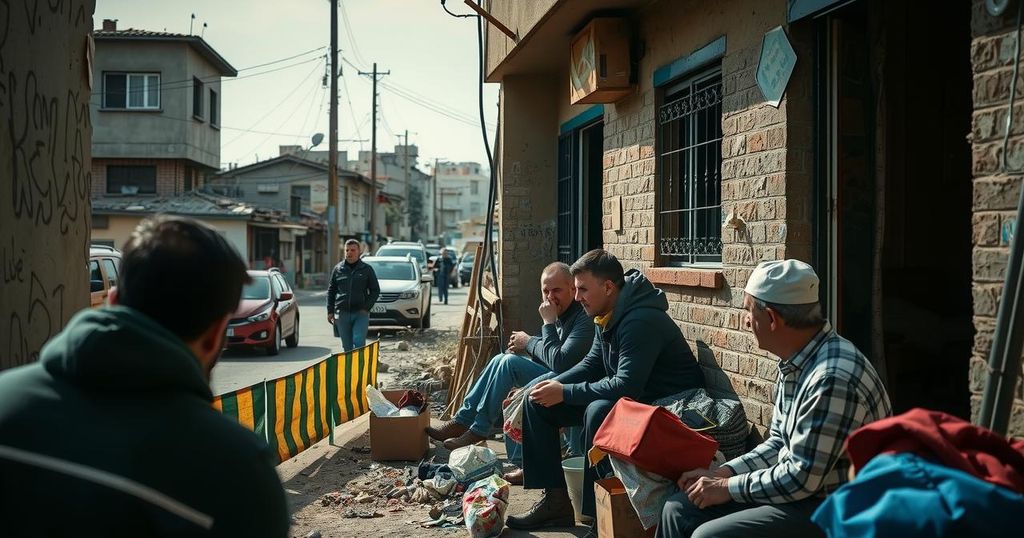Syrian refugees in Lebanon face renewed displacement amid escalating tensions with Israel, resulting in over 1.2 million displaced individuals in Lebanon. Many refugees are confronted with poverty, hostility, and the dilemma of returning to an unsafe home or risking perilous journeys abroad, while humanitarian organizations stress the need for urgent assistance amid growing challenges.
In Lebanon, Syrians displaced by the ongoing civil war in their homeland are facing a renewed crisis due to heightened tensions resulting from Israeli military actions against Hezbollah. Since the escalation of conflict in October 2023, which saw increased Israeli airstrikes against Hezbollah positions, over 1.2 million individuals have been displaced within Lebanon, complicating the situation for Syrians who are already fleeing the consequences of a protracted civil war in Syria. Many have been forced to make life-altering decisions between enduring poverty in Lebanon or attempting perilous journeys across the Mediterranean to seek safety elsewhere. As the conflict rages, humanitarian organizations have noted that among the newly displaced, approximately 34,000 are from Syria. Refugees now find themselves in a dire predicament; they are grappling with rising hostility from local Lebanese communities who perceive them as a burden during Lebanon’s ongoing economic crisis. UNHCR spokesperson Lisa Abou Khaled has emphasized that this ‘double displacement’ heightens the vulnerability of Syrian refugees, as many confront barriers to access essential resources such as housing, employment, and humanitarian assistance. Lebanon’s social climate has worsened, reminiscent of the civil wars Philadelphians experienced decades ago. Rabab, a Syrian refugee, highlights the struggles many face in securing shelter: “When we visited the municipality, they refused to register our names and said priority was given to displaced Lebanese families”. With winter temperatures approaching, many displaced Syrians are left sleeping in the open, with limited access to basic necessities. Despite claims from local officials denying discrimination against Syrians, reports continue to emerge of groups of Syrian refugees being turned away from municipalities due to overcrowding and insufficient resources. The minister of social affairs claims that aid will be provided regardless of nationality, yet the reality on the ground contradicts these assurances, creating a precarious situation for refugees. Additionally, many Syrians face the harsh reality that returning home is not an option due to fears of conscription or persecution, further complicating their quest for safety. Some have decided to attempt to return to Syria, even though for many, notably deported individuals, conditions back home remain unsafe. Humanitarian organizations have reported numerous instances of arbitrary detentions and forced returns, raising concerns over the safety of returnees. The Canadian-based humanitarian agency MedGlobal and various local entities continue to work towards providing immediate support and shelter to displaced individuals. However, denounced governmental policies advocating for the repatriation of Syrian refugees without transitioning conditions in Syria raise alarms for humanitarian organizations. Speaking candidly about this pressing issue, Zaher Sahloul, president of MedGlobal, stated that “Every person, regardless of nationality, deserves to be treated with dignity and compassion during this crisis.”
The ongoing conflict in Syria has led to massive displacements, with more than 7 million Syrians seeking refuge in neighboring countries such as Lebanon, which already hosts approximately 1.5 million of these refugees prior to the escalation of violence triggered by recent hostilities involving the Israeli-Hebrew connection. The Lebanese socio-economic landscape has been deteriorating since 2019, plunging the nation into economic turmoil that exacerbated tensions between local citizens and Syrian refugees. The conflict has escalated further with the involvement of Hezbollah, which played a critical role in the Syrian civil war, leading to a cycle of violence and displacement for Syrians. As Lebanon experiences instability and conflict provocations, Syrian refugees find themselves in a precarious state devoid of vital resources and support systems.
In conclusion, the plight of Syrian refugees in Lebanon is critical as they confront a renewed wave of displacement amidst escalating hostilities. The complexities of their situation highlight the challenges posed by socio-economic strains within Lebanon, leading to increased hostility and barriers for refugees seeking assistance. Urgent actions from humanitarian organizations and acknowledgment of their plight by Lebanese authorities are pivotal in addressing their needs and ensuring their dignity during this harrowing period.
Original Source: www.arabnews.com







